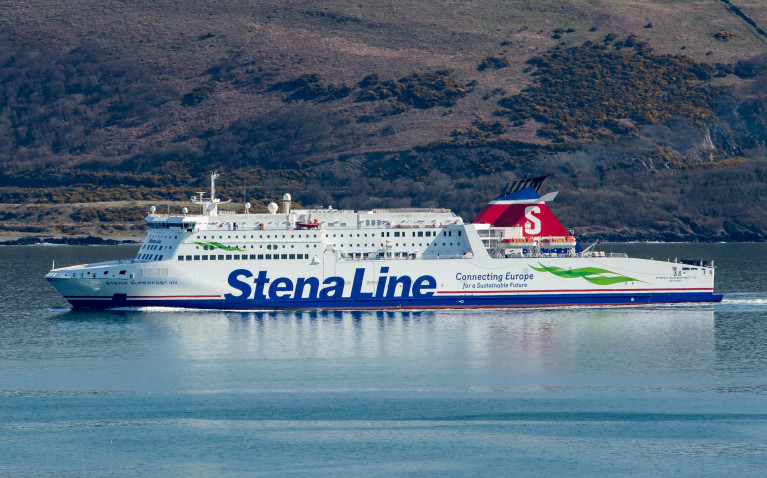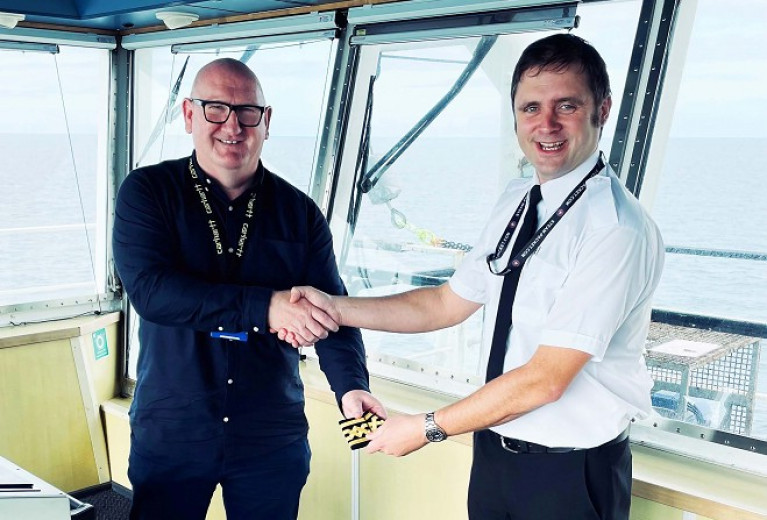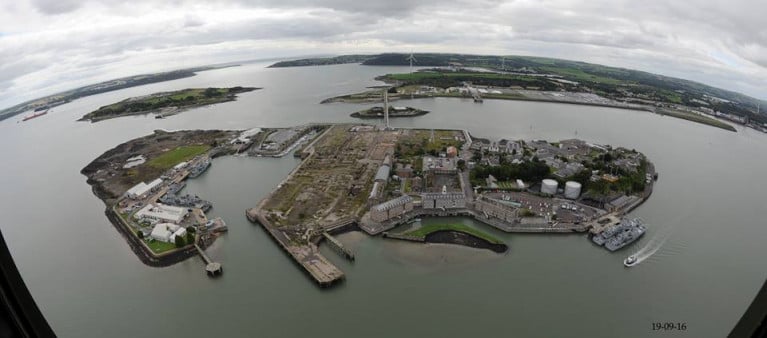Displaying items by tag: Crew Member
The Isle of Man Steam Packet has promoted Adam Kelso to the rank of Master of the ropax ferry Ben-my-Chree, which has 1,235 freight lane metres and a passenger capacity of 630 passengers.
Adam, born and raised on the Isle of Man, joined the ferry operator in October 2012, fulfilling a life-long dream. He follows in his father's footsteps, who was a Chief Engineer with the company for many years.
His career began with the Steam Packet Company as a Second Mate, having completed studies in Nautical Science at Fleetwood Nautical College. With the company's support, Adam completed his Chief Mate's Ticket, before commencing studies for his Master Mariner certification, in December 2021.
Working on a week on/week off rotation, Adam completed his eight weeks of training on 8 June 2022, and took up his first command earlier this summer.
As Master, Adam has overall responsibility for the safety of life, protection of the vessel, and safety of the environment. He's also responsible for ensuring the vessel complies with international and local regulations.
Managing Director of the Isle of Man Steam Packet Company, Brian Thomson, commented: 'Adam's achievement will be a great inspiration to anyone considering a career at sea. The Isle of Man Steam Packet Company is proud to support such a dedicated and talented team member in achieving his ambitions. We wish Adam many happy years of sailing with the Company.'
Sailings On Stena Scotland Service Cancelled after Positive Covid Test
Operator Stena Line cancelled four of its ferry sailings between Scotland and Northern Ireland after one crew member tested positive for Covid-19.
Its 19:30 BST departure from Cairnryan and 23:30 BST departure from Belfast were cancelled on Wednesday.
On Thursday, the same incident led to the company calling off its 03:45 BST departure from Cairnryan and its 07:30 BST departure from Belfast Harbour.
"We apologise to our passengers for the inconvenience," Stena said.
The company said it had acted in accordance with its "comprehensive safety protocol procedures".
BBC News has more.
Crew Member of Isle of Man Ferry Promoted to Relief Master
Ferry crew member, Scott Kaniewski has been promoted to the rank of Relief Master of the Isle of Man Steam Packet ro-pax Ben-my-Chree which operates between Douglas and Heysham in north-west England.
Kaniewski joined the Isle of Man Steam Packet Company in 2014 from Global Marine Systems where he worked his way up from Deck Cadet – with responsibility for cable repairs in both shallow and deep water.
In addition Scott's involvement in ship conversions and new builds, all the way up to Third Officer/Junior DPO, Second Officer and then Chief Officer.
Upon his arrival at the Steam Packet Company, Scott worked as a Second Officer and then Chief Officer on board the Ben-My-Chree.
In 2017, the Company supported his application for study leave to gain his Masters Certificate of Competency, and in 2019 he transferred to fast craft Manannan to sail as Chief Officer.
Over the past month Scott has been Master training on the Ben-My-Chree to obtain his Heysham Pilotage Certificate, and on Thursday 12th August he took command as Relief Master of the ro-pax. In the near future he will also be trained as Relief Master on Manannan.
Commenting on the promotion, the company's Managing Director Brian Thomson said: ‘Scott’s progression through the ranks is a perfect illustration of the fantastic career opportunities that are available for those who choose a career at sea.
He added "it is a truly rewarding industry for those who work hard. He is very deserving of this great achievement and we wish him many years of sailing with the Isle of Man Steam Packet Company.’
Search for Missing Irish Ferries Crew Member Leads to Body Found
In the search for a missing Irish Ferries crew member a body of a man has been discovered.
North Wales Police have confirmed that the discovery was made on the shore near Ynys Y Fydlyn in Anglesey on Wednesday morning.
Formal identification is yet to take place, but the family of the missing ferry crew member have been informed.
A police spokesman said: "Shortly after 11am today North Wales Police were contacted by a member of the public reporting the discovery of a body on the shore, near to Ynys Y Fydlyn, Anglesey.
"Police officers, supported by partner agencies, attended the scene and confirmed that the body was that of a deceased male.
Further coverage avaialble from NorthWalesLive here.
Associations Call for Compensation of Troops Who Quarantine
Two representative associations of the militiary are seeking financial compensation for troops who are forced to leave their families two weeks prematurely to go into compulsory Covid-19 quarantine prior to deploying on overseas missions.
Meanwhile, the Naval Service has confirmed that it's had to “deep clean” one of its ships after a sailor was confirmed as having the virus.
Both PDForra, which represents enlisted personnel, and RACO, which represents officers, have sought compensation for troops who are having to leave their families two weeks earlier than usual before UN deployment.
PDForra wrote to the Department of Defence saying it believes a special payment is “warranted given the analogous nature of quarantine.”
For more on what the association said click Irish Examiner here.



























































